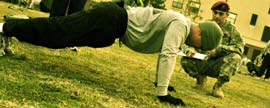Good Question! The answer is not so black and white or clear cut. That’s where experience comes into play.
For the abdomen measurement, AR 600-9 clearly addresses the individual is to be relaxed and when the measurement is to be taken (para B-4 applies to males and B-5 to females).
B–4. Circumference sites and landmarks for males
a. Abdomen. Measure abdominal circumference against the skin at the navel (belly button), level and parallel to the floor. Arms are at the sides. Record the measurement at the end of Soldier’s normal, relaxed exhalation. Round abdominal measurement down to the nearest 1⁄2 inch and record (for example, round 343⁄4 to 341⁄2).
I trained and certified all my NCOs who conducted weigh-ins to watch for certain indicators and react appropriately. When taking stomach measurements I had the NCOs talk to the Soldier, asking questions that required answers and did not allow the individual time to concentrate on the measurements being taken. This caused Soldiers to relax and we usually got a good measurement. If it was apparent the Soldier was “sucking in” we would have the Soldier take a series of deep breathes and have them exhale, then take the measurement at the end of the exhale.
When taking height we would have a second person stand to the side of the individual whose height was being taken to see if they were attempting to raise up on their feet to gain a height advantage.
With regard to bulking up the neck, it is a way to game the system and no system is perfect. If an individual desires to exercise to beat the system there is really nothing you can do. If they however are hunching their shoulders and engaging their neck muscles, they are in violation of the regulation.
B-4, b. Neck. Measure the neck circumference at a point just below the larynx (Adam’s apple) and perpendicular to the long axis of the neck. Do not place the tape measure over the Adam’s apple. Soldier will look straight ahead during measurement, with shoulders down (not hunched). The tape will be as close to horizontal as anatomically feasible (the tape line in the front of the neck will be at the same height as the tape line in the back of the neck). Care will be taken so as not to involve the shoulder/neck muscles (trapezius) in the measurement. Round neck measurement up to the nearest 1⁄2 inch and record (for example, round 16 1⁄4 inches to 16 1⁄2 inches).
Here is my suggestion. Anyone trying to game the system is clearly not meeting the standards of performance. If it is something that is difficult to prove, let it go. If they are substandard it will come up in other areas of performance that you can adequately document and take action against them in a professional manner. There are a few options you have available but I would only use them in extreme situations and I highly recommend a witness be present:
- If you sincerely believe the Soldier is sucking in or bulking up you could counsel them about it and discuss a values violation and include that their actions violate the spirit of an order.
- You could give them a “NO” rating in a values block on their draft or working copy of their evaluation report. I’m not so sure I would use it on the finalized report, though.
- You can give them an order to relax or not bulk up before the weigh in.
The best method of action is to have a professional conversation with the Soldier and explain that you believe they are in violation of the regulation. After that I would apply the standard to the best of my ability.
Keep in mind from a regulatory perspective there is nothing wrong with the Soldier bulking up their neck. You could stretch to say they are violating the spirit of the order but any time you have to stretch for a solution, it’s best to let it go.
Last but not least I encourage you to have a professional one-on-one conversation with the Soldier and document it as a counseling session. Find out why they are overweight or borderline. Be proactive. Send them to nutrition class, outline a PT program, work with a Master Fitness trainer, etc. By being proactive you show you care and have the best interest of the Soldier and unit at heart. If the Soldier shows a genuine desire to improve you have made a Soldier better. If the Soldier chooses not to be proactive, his apathy will work against him when he later becomes enrolled in the weight control program.












